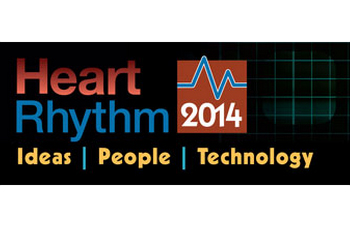
MassDevice.com was on-site at Heart Rhythm 2014, the Heart Rhythm Society’s 35th Annual Scientific Sessions, where we covered some of the biggest topics, including battery wars, lead-free cardiac rhythm implants, vibration monitoring devices used in machine monitoring conditions, and the mysterious power of remote patient monitoring.
With an agenda the size of a phone book, there were plenty of sessions that fell through the cracks, including reports from some of medtech’s biggest players. Here are some of our favorites:
Medtronic delays shocks for "PainFree" ICD
Data from a Medtronic (NYSE:MDT) study on secondary prevention implantable cardioverter defibrillator therapy found that patients fared just as well when their implants were programmed to wait longer than usual before delivering shocks.
The report, from Medtronic’s PainFree SST study, found similarly low rates of inappropriate shocks and similarly high rates of freedom from arrhythmic fainting episodes, Medtronic announced. Previous studies on prolonged detection times have focused on primary prevention patients who have not had a heart attack but who are at increased risk, the company noted. The new report focused on higher-risk patients who have already experienced an episode of cardiac arrest and how are often managed with more aggressive ICD therapy.
Read more of MassDevice.com’s coverage of Heart Rhythm 2014.
Patients in the PainFree SST trial were implanted with Medtronic’s Protecta ICDs, which feature the company’s proprietary SmartShock technology that aims to better differentiate between dangerous and harmless heart rhythms.
"The results of this study are important for secondary prevention patients, who often are treated with more aggressive ICD programming to address arrhythmic events as quickly as possible," Canadian cardiologist Dr. Laurence Sterns said in prepared remarks on Medtronic’s behalf. "Previous studies have demonstrated that devices programmed to wait longer to deliver therapy do not increase the risk of fainting episodes among primary prevention patients, and now we know the same strategy can be safely used in more patients, even patients at increased risk based on their disease progression."
 Remote monitoring brings down deaths, hospitalizations
Remote monitoring brings down deaths, hospitalizations
ICD and CRT-D patients under remote monitoring via Boston Scientific’s (NYSE:BSX) LATITUDE system were less likely to die or end up back in the hospital compared with patients not followed on the system, according to the company’s PREDICt-RM study.
Remotely monitored patients had a 33% reduction in risk of death as well as a 19% relative reduction in hospitalizations for any cause, the company reported. The findings are similar to remote monitoring data presented last week for patients with St. Jude Medical’s (NYSE:STJ) implants.
Read more
 Medtronic’s pacemaker programming may curb atrial fibrillation
Medtronic’s pacemaker programming may curb atrial fibrillation
Results from Medtronic’s MINERVA trial suggest that the company’s proprietary Reactive ATP pacemaker algorithms may actually prevent progression of persistent atrial fibrillation in patients with a slow heartbeat.
Read more
 St. Jude’s quadripolar leads help hospitals save cash
St. Jude’s quadripolar leads help hospitals save cash
Results from a St. Jude Medical study found that the company’s Quartet Quadripolar LV leads helped hospitals reduce per-patient costs by an average of 62% compared with patients implanted with St. Jude’s non-quadripolar LV leads, due in large part to fewer hospitalizations.
Read more
 Medtronic tries a new lead implant technique
Medtronic tries a new lead implant technique
Medtronic reports promising results in treating difficult heart failure patients via leads implanted inside, rather than outside, the heart’s left ventricle.
"There is a significant need for a new way to pace the left ventricle in patients unable to receive the clinical benefits of standard CRT therapy, and this study suggests left ventricular endocardial pacing is a feasible option," lead investigator Dr. John Morgan said in prepared remarks on behalf of the company. "These findings will elevate this new approach from something that is investigational to one that is closer to the mainstream."
Read more
- Examining potential high-voltage failures in St. Jude’s recalled Riata leads (See also St. Jude Medical and the ghost of product recall past)
- Ablationists are more likely to recommend ablation, small study finds
- EBR Systems’ Wireless Cardiac Stimulation System may help hard-to-treat heart failure patients
- Do solar winds and other geomagnetic activity protect ICD patients?
- St. Jude’ contact-force ablation technology meets endpoints for safety and efficacy
- Researchers try spinal cord stimulation for heart failure patients

